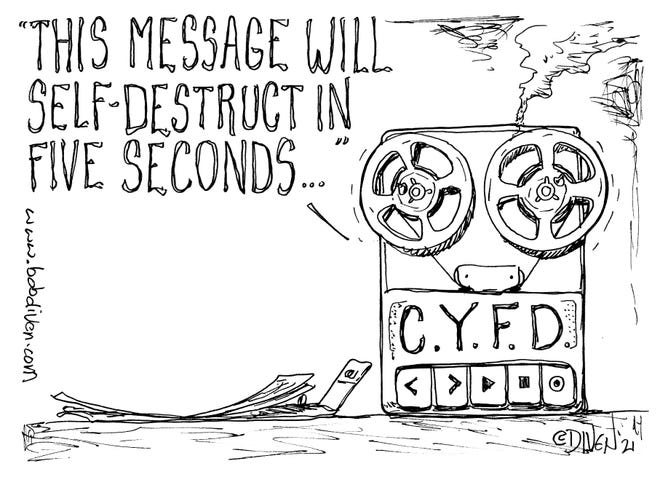Our View: New Mexico AG review sorely needed as a state department deletes records

The systematic deletion of chat and other records taking place in the state’s Children, Youth and Families Department, revealed last month by a nonprofit news organization, is jarring — largely due to the department secretary’s insistence that destroying public records is a good and necessary thing.
It frees up space, you see.
The state agency in charge of overseeing foster children, child welfare and juvenile justice found a way for its employees to have private communications about agency business and — using an encrypted communications app — make those communications vanish into the ether.
Had that communications app not been available there might have been a paper trail through emails and other sources the employees would have used to communicate, so attorneys and members of the public concerned about the content of those now-deleted conversations could seek their disclosure.
Editorial: Why don't Texas' U.S. senators want to take convicted abusers' guns?
The result: Instead of such documents, video conversations or electronic files someday going before a judge who might rule upon their importance, the CYFD negated that possibility with a delete setting on an app.
New Mexico’s Attorney General Hector Balderas told the Associated Press that he is “highly concerned” about the claims made in a Searchlight New Mexico article, and is looking into the claims. We trust him to do so.
The article ran in the April 28 edition of the Daily Times and in other publications.
Democrats have so far been pretty quiet, and the silence from the governor's office last week was deafening. Republicans, however, have been quick to criticize this blatant affront to the spirit, if not letter, of laws protecting the public’s right to know.
“What we have seen over the past year is a government that has hidden itself away in a maze of virtual walls,” House Republican Leader Jim Townsend of Artesia said to the Associated Press. “For the leadership in any state agency to think that they can circumvent transparency by deleting public documents is a slap in the face to New Mexicans who have placed their trust in public service.”
Guest Editorial:Straight-party voting is bad for our elections
The CYFD is pulling out various reasons why the encrypted app Signal is necessary, such as employees working at home with unsecured home internet connections that might jeopardize someone’s privacy. And, of course, they pulled out the privacy regulations in the Health Insurance Portability and Accountability Act of 1996 (HIPAA), which have nothing to do with determining whether State of New Mexico records should be destroyed.
Here’s the worst reason for the deletions, included in the nonprofit Searchlight New Mexico’s article:
“We destroy records every day because we have to; otherwise, we’d run out of space,” CYFD Secretary Brian Blalock told Searchlight New Mexico.
The article then noted the department also shreds paper communications and deletes conversations on other messaging software used by employees.
We’re assuming the head of CYFD knows the difference between filing cabinets and our world’s now nearly infinite capacity for online data storage. When a document can be copied and saved, or, if paper, scanned and stored, there’s pretty much no such thing as running out of space.
All records compiled regarding the business of CYFD and other agencies can and should be stored. In CYFD’s case this is especially vital in case a judge needs to look at records to decide whether they should be released and/or are evidence in a court case involving children and their families.
Public records laws exist across our country to safeguard public information and make it available, except when laws specifically exclude certain information from public review.
Guest Editorial:Trade is in turmoil — why hasn't Wilbur Ross been fired?
Technology has moved so fast beyond standard email and messaging platforms that messages generated by public officials can be automatically secured, read and then deleted.
In this case compliance to public records laws must be reviewed by the Attorney General, and the AG's office should move against any violations of the public’s right to transparency in state government.
We see automatic deletions of discussions about public business as a breach of the public's trust, and we believe this should be a bipartisan concern in the Roundhouse. If that practice isn’t illegal now, old laws need to be rewritten to catch up with new practices.
For questions about Opinion Page content contact Editor John R. Moses at 505-564-4624, or via email at jmoses@daily-times.com.
Support local journalism with a digital subscription: http://bit.ly/2I6TU0e